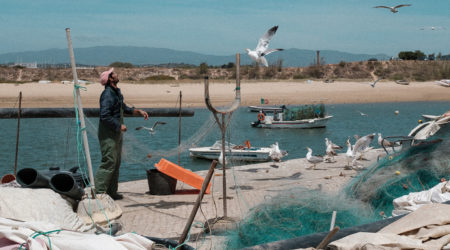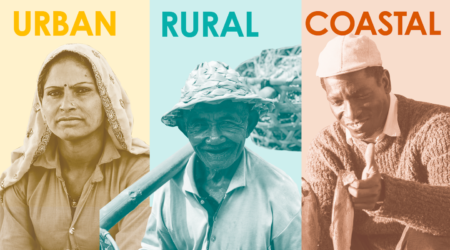Press release: New Global Climate Task Force Launches Framework for Digital Financial Solutions to Improve the Climate Resilience of One Billion People
The Framework illustrates how digital finance innovations can contribute to improved climate resilience for vulnerable populations globally and recommends actions to enable the growth of the Digital Finance for Climate Resilience ecosystem by 2030
BOSTON, MA, USA, October 25, 2021 – Today, the Digital Finance for Climate Resilience Task Force (DF4CR) released an interactive Framework for Action that illustrates the opportunity for the financial sector to build climate resilience among the world’s most vulnerable populations.
The Task Force, coordinated by BFA Global and made possible by financial support from PayPal, convened experts from Better Than Cash Alliance (BTCA), Consultative Group Assisting the Poor (CGAP), PayPal, the team at the United Nations Race To Resilience, and the World Resources Institute (WRI), to explore the opportunity for digital finance innovations to power greater climate resilience around the world. The Framework for Action outlines the need for over $25 billion in investment to flow into the Digital Finance for Climate Resilience (DF4CR) ecosystem by 2030, with the potential to benefit one billion people. It also details tangible steps that innovators, catalytic funders, investors, regulators and policymakers, and ecosystem enablers can take now and in the future to accelerate the ecosystem’s growth.
“At PayPal, we recognize the important opportunity for digital finance to bring about innovative adaptation and resilience solutions for those who are most vulnerable,” said Sri Shivananda, executive vice president and chief technology officer, PayPal. “The Framework for Action’s evidence-based resources will help committed stakeholders deliver fintech solutions that help people on the front lines of climate change to anticipate and recover from disasters, adapt livelihoods, and build long-term resilience. We look forward to partnering, learning, and helping to enable the Digital Finance for Climate Resilience ecosystem.”
The negative effects of climate change most significantly impact the financially underserved who are dependent on natural resources, as well as populations residing in particular geographies, such as urban settlements and coastal regions. Climate resilience solutions can help these at-risk individuals and communities anticipate, adapt, and recover from the physical and economic impacts of climate change; however, these populations often lack access to such solutions. According to the Task Force, digital finance and fintech solutions can improve the affordability, usability, and reach of climate resilience solutions into impacted communities. For example, innovations like crop insurance, flood alerts, and carbon marketplaces can leverage mobile finance applications to better reach and benefit climate vulnerable populations, and as a result, build greater climate resilience.
“We know the world’s poor will suffer disproportionately from the impacts of climate change,” said Stephen Rasmussen, interim chief executive officer, CGAP. “We also know that around 1.7 billion people do not have access to a bank account, let alone the financial services needed to cope with the shocks and stresses of climate change. There is both a need and an opportunity to take a fresh look at financial services to understand how digital technologies and fintech could help build the resilience of the poor.”
In consultation with over fifty participating climate and digital finance experts, the Task Force evaluated the historical growth of similar innovation ecosystems, including pay-as-you-go technology, inclusive fintech and others to understand what catalyzed its emergence and growth. Based on these findings, the Task Force developed the Framework for Action to outline the key actions necessary for innovators, catalytic funders, investors, regulators and policymakers, and ecosystem enablers to scale the DF4CR ecosystem by 2030.
“At BFA Global, we recognize there is an urgent and growing need to provide the world’s most vulnerable populations with access to tools that can help them build resilience against the rising impacts of climate change,” said David del Ser, chair and chief innovation officer, BFA Global. “We’re proud to be leading this important work, with the help of the Task Force and some of the world’s leading climate and finance thinkers, as we leverage our knowledge of digital finance innovation to help climate resilience solutions overcome barriers to access and better serve those in need.”
# # #
About the DF4CR Task Force
The Digital Finance for Climate Resilience Task Force was convened in 2021 to determine the opportunity for the digital finance industry to enable access to climate resilience solutions, and chart a path to scale up an innovation ecosystem of innovations. The Task Force brings together experts from climate change science and policy from the World Resources Institute (WRI) and the United Nations Race to Resilience, and digital finance and financial inclusion from BFA Global, PayPal, Consultative Group Assisting the Poor (CGAP), and the Better than Cash Alliance (BTCA). Each task force member has deep domain expertise, along with experience in public good knowledge creation, coalition building and co-creation, and deep networks into climate and digital finance experts globally.



